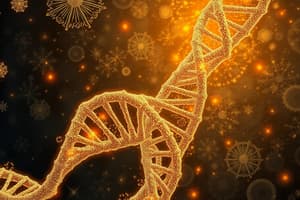Podcast
Questions and Answers
What is the function of the cell membrane?
What is the function of the cell membrane?
- To separate the cell's interior from the external environment (correct)
- To regulate cell division
- To store genetic information
- To synthesize proteins inside the cell
Where do the most essential functions of the cell take place?
Where do the most essential functions of the cell take place?
- Cell membrane
- Cytoplasm (correct)
- Nucleus
- Mitochondria
What is the primary purpose of cell division?
What is the primary purpose of cell division?
- Protein synthesis
- Growth and repair (correct)
- DNA replication
- Energy production
Which organelle is responsible for energy production in the cell?
Which organelle is responsible for energy production in the cell?
Which organelle is responsible for producing adenosine triphosphate (ATP) through cellular respiration?
Which organelle is responsible for producing adenosine triphosphate (ATP) through cellular respiration?
Where is the cell's genetic material, DNA, stored within the cell?
Where is the cell's genetic material, DNA, stored within the cell?
Which organelle is responsible for synthesizing proteins by converting messenger RNA (mRNA)?
Which organelle is responsible for synthesizing proteins by converting messenger RNA (mRNA)?
Which organelle serves as a sorting and packaging center in the cell?
Which organelle serves as a sorting and packaging center in the cell?
What is the function of the rough Endoplasmic Reticulum (ER) in the cell?
What is the function of the rough Endoplasmic Reticulum (ER) in the cell?
Why is understanding organelle function essential for cell organization?
Why is understanding organelle function essential for cell organization?
What is the function of the plasma membrane in a cell?
What is the function of the plasma membrane in a cell?
Which organelle is known as the command center of the cell?
Which organelle is known as the command center of the cell?
What is the main function of mitochondria in a cell?
What is the main function of mitochondria in a cell?
What is the Endoplasmic Reticulum (ER) responsible for in a cell?
What is the Endoplasmic Reticulum (ER) responsible for in a cell?
What is the function of the Golgi Apparatus in a cell?
What is the function of the Golgi Apparatus in a cell?
Where does protein synthesis occur in a cell?
Where does protein synthesis occur in a cell?
What is the role of Lysosomes in a cell?
What is the role of Lysosomes in a cell?
Study Notes
Unlocking Life's Building Blocks: Understanding Cell Organization
At the heart of all living things, you'll find the intricate world of cell organization, a fascinating realm where the interplay of cell structure, cell division, and organelles shapes life's elaborate tapestry.
Cell Structure
When you delve into the architecture of a cell, you'll encounter a variety of components that contribute to its function. The cell membrane, formed from a double layer of phospholipids, is the cell's boundary, acting as a barrier that separates the cell's interior from the external environment. Inside this membrane lies the cytoplasm, a gel-like fluid containing numerous proteins, salts, and organelles. It's within this cytoplasm that the cell's most essential functions take place.
Cell Division
Cell division, or mitosis, is a process that allows cells to reproduce and pass their genetic inheritance to their offspring. It's a complex and tightly regulated series of steps that ensures the accurate transfer of genetic information. The end result is two genetically identical daughter cells, each capable of independent functioning.
Cell division occurs for two primary reasons: growth and repair. As organisms grow, new cells are required to form tissues, which in turn make up organs. Simultaneously, cells are constantly dying and need to be replaced. Cell division is the mechanism that ensures this continuous cycle of renewal.
Organelles
Within a cell's cytoplasm, specialized structures known as organelles are the hubs of cellular activity. These organelles are each responsible for specific functions that contribute to the cell's overall survival and function. Some of the most important organelles include:
- Nucleus: Houses the cell's genetic material, or deoxyribonucleic acid (DNA), and is the site of transcription and replication.
- Mitochondria: The cell's powerhouses, producing adenosine triphosphate (ATP) through cellular respiration.
- Ribosomes: Protein-synthesizing machines responsible for converting messenger RNA (mRNA) into functional proteins.
- Endoplasmic Reticulum (ER): A network of membranes involved in protein synthesis and lipid production. The rough ER is covered in ribosomes, while the smooth ER performs various metabolic functions.
- Golgi Apparatus: A sorting and packaging center, modifying and sending proteins and lipids to their final destinations.
These organelles, among others, work in concert to maintain and regulate the cell's functions.
Bringing It Together
Understanding cell organization requires a holistic view of cell structure, cell division, and organelles. By studying these fields in combination, we gain a deeper appreciation of how cells work together to form the complex, diverse structures that make up living things. Knowledge of cell organization also forms the foundation for further explorations into more advanced areas of biology, such as molecular biology, cell biology, and genetics. Cell structure information is readily available from general biology resources typically covered in high school or college-level biology courses. Cell division is a fundamental concept in biology and can be found in textbooks and online resources at various educational levels. Organelles are important components of cellular structure and are commonly discussed in cell biology courses. Organelle function is an essential component of cell organization and is covered in detail in cell biology texts and online resources. The search results provided do not contain content directly related to cell organization, cell structure, cell division, or organelles. The content is not relevant to this article.
Studying That Suits You
Use AI to generate personalized quizzes and flashcards to suit your learning preferences.
Description
Test your knowledge on cell organization, including cell structure, cell division, and organelles. Explore the intricate world of cells and their components in this quiz.




